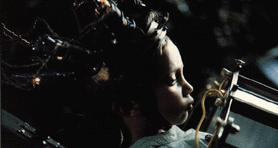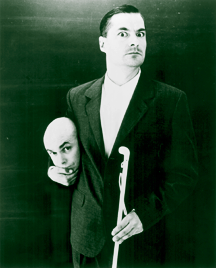
Jean-Pierre Jeunet and Marc Caro strip all sentiment out of their
live-action fantasy 'The City of Lost Children'
By Richard von Busack
As big a spectacle as Batman Forever and immeasurably smarter, The City of Lost Children is the kind of disturbing live-action fantasy that will be talked about for years--like Blade Runner, Eraserhead and Brazil. Directors Jean-Pierre Jeunet and Marc Caro (Delicatessen) have kept their new film free of the sentiment associated with American fantasies. "It was our choice to make this not very sentimental," Jeunet tells me, "because that's the way we are. Reserved."
They must be joking. Few moviemakers have opened up their subconscious the way Jeunet and Caro have in this visionary epic. Essential to their method is the use of a cartoon universe as a symbol of chaos: a stylized background of worst-case scenarios, made ridiculous by the too-muchness of the decay and desolation. Against such a background, burnished by the morbidly romantic music of Angelo (Twin Peaks) Badalamenti, catastrophe becomes a laugh riot.
The action is set in a lawless, murky and polluted city built of grimy Victorian clockwork and sinister 1920s electric equipment whose main industry seems to be a nonsexual trafficking in children. Joseph Lucien plays Denree, a kidnapped boy, a rather moony child whose only word is a belch. Denree is sought by his adopted brother, One (Ron Perlman), a street-corner strongman (whose chest-expansion chain-breaking trick echoes the one Anthony Quinn performed in Fellini's La Strada). A hard-bitten but gallant young girl, Miette (Judith Vittet), accompanies One on a quest that leads them through a labyrinthine seaside port on an ocean of what looks like green radiator coolant.
The City of Lost Children also visits the offshore oil-drilling platform that serves as the headquarters of the villain Krank (played by the startlingly ill-favored Daniel Emilfork, whose face looks like a skinned sheep's head). Krank, who steals dreams to prevent his own aging process, is served by a set of clones (all played by Dominque Pinon, the perplexed-looking hero of Delicatessen) and by Irvin, a migrainous brain in an aquarium (voiced by Jean-Louis Trintignant).
The mad doctor is at the top of the child-buying pyramid supported by some wharf-rat gangsters: a pair of Siamese-twin Fagins (Genevieve Brunet and Odile Mallet) known as the Octopus; and the Cyclops, a proselytizing religious order of the blind ("Renounce the gift of sight! Enter the world of the chosen ones").
Despite all the lip service paid to chaos theory in Jurassic Park, nothing there illustrates the patterns underlying seeming randomness half as well as The City of Lost Children. Fatalities occur in the nameless city, seemingly without meaning but always with a cause-and-effect response.
Jeunet and Caro are fans of Tim Burton, an ex-animator like themselves. In Burton's Beetlejuice, there's a highly philosophical gag about a dog who decides if a couple will live or die (the animal is a live counterweight on a teeter-totter with an automobile hanging over the side of a bridge). It's a fairly profound joke, demonstrating the possibility for quick and meaningless death of even nice people because of random circumstance (the people in the car had gotten into the mishap swerving to avoid hitting the very same dog).
Similarly, in The City of Lost Children, a child's tear sets in motion the wreck of a ship; sea gulls and a basket of rotten fish trigger an execution; and a simple, grimly hilarious device keeps food perpetually out of the reach of a starving mutt.
Almost always, these mechanical gags are dire, like the complicated death traps constructed by the suicidal Mrs. Interligator in Delicatessen. Caro says that he saw Rube Goldberg's cartoons only after he made Delicatessen. He was really inspired by the infernal machines on Mission: Impossible--all of those complex mechanisms that should have backfired, if there was any real justice.
The comic cruelty is suffused with a touch of French fatalist romanticism. Facing her certain death, Miette says quietly, "You're born in the gutter, and you end up in the port," an observation that would be piercing if she and One weren't both wound up like a pair of bobbins with much, much more rope than is needed to immobilize them.

Bring Me the Head of My Collaborator: Jean-Pierre Jeunet puts Marc Caro in a headlock.
As profound as the film's immediate fantastical surface is, there's a lightness throughout that pays off. The carefully constructed imagery is infused with a flexibility and dreaminess that drops out, like the platform in a scaffold, for moments of horror. Strange Days tiresomely circled one monstrous idea for two hours; watch how playfully and quickly The City of Lost Children handles the same horrible notion of watching yourself die on camera.
In America for a few days, Messieurs Caro (small, bald, affable) and Jeunet (taller, more handsome, more chilly) stop for a while to talk, to give their opinion of Emilfork ("He has the character of a pig, an insect. He was adorable with us, though") and to teach me the useful French phrase "klaoune psychotique" ("psychotic clown").
There is no bad clown in The City of Lost Children, although there is a very sinister one in Delicatessen, and the new film features a battalion of bad Santas. Jeunet explains that based on their research, "a lot of people were afraid as children to run into Santa Claus by the fireplace when they woke up in the middle of the night."
This ambitious production had been planned for more than 14 years and took eight months to shoot. "This whole thing was hard," Jeunet complains. "We had everything you shouldn't do in a film: the ocean in the studio, the children, the animals, the sea gulls, the special effects, the old actor with a difficult character and an American actor who didn't speak French."
The collaborators met at a French animation festival in 1974. Jeunet, a dropout who worked for the telephone company, was a hobby animator, interested in how animation was a way to access film all by yourself. Caro was a cartoonist who had been published in both newspapers and in Metal Hurlant, the comic magazine translated here as Heavy Metal. Caro designed puppets for Jeunet's films, and the two worked together on French rock videos.
Asked how they divide the task of directing, Jeunet says, "We take the synopsis first, and then we take ideas from there. After we get everything written out, we take them to a scenariast, a dialogue director [Gilles Adrian is credited with the screenplay] who puts everything together. After everything is written out, Marc will do the storyboard for the look of the film, and I handle the direction. Not everything is allowed; we have to set limits. The most important word in film is 'consistency.' "
But how are those limits set? "We have the same sensibility, so one person can set the limits and the other follows. Usually, it's instinct. Even in casting the actors, all it takes is one look, and we can tell we're together on it. It's true that our way of working together is not so far apart from the way the Octopus cook in the movie."
Neither of the two have children, although Caro jokes about having a test-tube baby back home. Watch for The City of Lost Children to be condemned as too scary for kids, as if they were the only audience for a fantasy that matters. Jeunet and Caro are dismayed to find out their film, with minimal violence and a brief view of some topless ladies, has been given an R rating.
"We think it's an optimistic film," Jeunet explains, "heroic and positive, even though the universe is somber. In fairy tales, you always have a dark forest, and there's only one light shining, and that's from the light of the ogre's house. For me, for the real darkness is in American films, the realistic violence with the guns."
Nevertheless, some of the young adults restricted from seeing this monumental film will be able to approach it from another direction, through the CD-ROM game, which Caro helped design. "I'm a little frustrated when I see a film," he says. "They're inventing a universe, but they're only letting you see a little part of it. With the CD-ROM, you'll be able to open the universe up. And it really helps in the way you can tell the story--helps to enlarge it."
Fantasies are often dismissed as lightweight, but they bravely address--and let you laugh at--profound matters, such as the strangeness and hopelessness of life, and the terror we feel for a mortally ill planet. The City of Lost Children has the sense, rare in cinema fantasies and especially rare in fantasies of this scope, to witness the imagination running in any direction it pleases.
[ Metro | Metroactive Central | Archives ]
